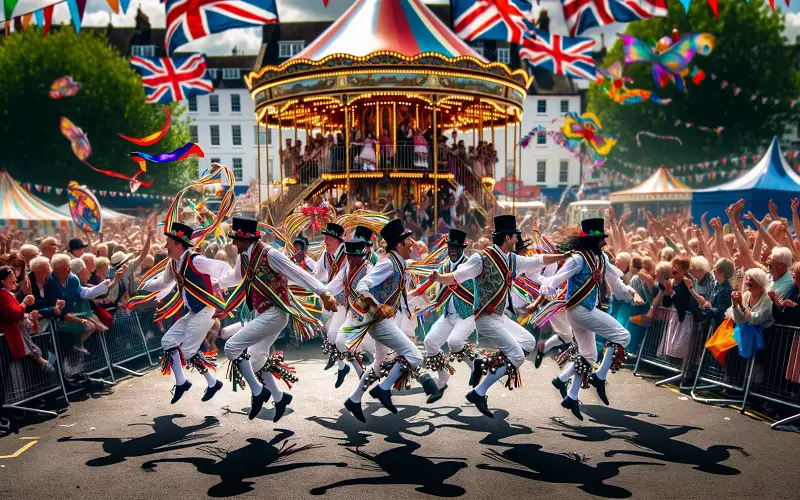Step into the vibrant tapestry of the United Kingdom, where traditions blossom like flowers in a lively meadow.
As you wander through the streets, you will encounter a plethora of festivals and events that ignite the senses and captivate the imagination.
From the rhythmic beats of Morris dancers to the crackling bonfires of Guy Fawkes Night, these time-honored celebrations weave together the threads of history, culture, and community.
So, let us embark on a journey to uncover the enchanting tapestry of traditional festivals and events in the UK, where each thread holds a story waiting to be unraveled.
Key Takeaways
- New Year's Day is celebrated with parties, music, fireworks, and dancing, and includes traditions like 'first footing' and carrying lighted tar barrels on the heads of guisers in Allendale.
- Plough Monday marks the beginning of the English agricultural year and is celebrated with a procession, collecting money for agricultural workers, and enjoying traditional Plough Pudding.
- Saint Valentine's Day is dedicated to love and romance, with traditions of exchanging gifts, cards, and flowers, as well as sending Valentine's Day cards.
- Easter celebrations include Easter egg hunts, hot cross buns, and a public holiday on Easter Monday, providing a time for relaxation, reflection, and enjoying time with loved ones.
New Year's Day
New Year's Day is a joyous and eagerly anticipated occasion that marks the beginning of a brand new year, filled with hope and excitement. In the United Kingdom, this day is celebrated with various festivals and events that have both religious and cultural significance.
One of the most famous celebrations is the New Year's Eve party, where people gather to bid farewell to the old year and welcome the new one with music, fireworks, and dancing. The atmosphere is electric as everyone comes together to celebrate the start of a fresh chapter.
In addition to the parties, there are also unique traditions that take place on New Year's Day itself. In the North of England, a tradition called 'first footing' is practiced, where the first person to enter a home after midnight is believed to bring good luck for the year ahead. This person is often a stranger, symbolizing the arrival of new opportunities and experiences.
Another notable celebration takes place in Allendale, where the ancient tradition of carrying lighted tar barrels on the heads of guisers still takes place. This event dates back to the 19th century and is a vibrant and thrilling spectacle to witness.
New Year's Day isn't only a time for celebration but also a time to reflect on the past year and look forward to the future. It's a day filled with hope, joy, and the promise of new beginnings.
Plough Monday
As the festive celebrations of New Year's Day come to a close, another significant event takes center stage in the United Kingdom, marking the beginning of the English agricultural year – Plough Monday. Falling on the first Monday after Twelfth Day (Epiphany), which is usually on 6th January, Plough Monday has been a part of British tradition since the late 15th century.
Plough Monday customs varied across different regions, but a common practice involved a procession with a plough, with participants going from house to house to collect money. This tradition helped support the agricultural workers during the winter months when work was scarce. Another traditional aspect of Plough Monday is the consumption of Plough Pudding, a suet pudding that's boiled and enjoyed on this day.
While Plough Monday may not be as widely celebrated as other events like Valentine's Day, Mother's Day, or the harvest festival, it remains an important part of British heritage. It's a reminder of the country's agricultural roots and the hard work that goes into sustaining the nation's food supply.
In a country known for its diverse range of festivals and events, such as Guy Fawkes Day, the Notting Hill Carnival, the Sidmouth Folk Festival, the Jorvik Viking Festival, Leicester's celebrations of Diwali, the Glastonbury Festival, and the Boxing Day tradition, Plough Monday stands as a unique and meaningful occasion that showcases the importance of agriculture in the United Kingdom.
Saint Valentine's Day
Every year on February 14th, people in the United Kingdom eagerly celebrate Saint Valentine's Day, a cherished occasion dedicated to expressing love and affection. This festival, which has its roots in British traditions, has become one of the most famous festivals in England. The day is marked by various celebrations and customs that have evolved over time.
In England, Saint Valentine's Day is often celebrated with romantic gestures such as exchanging gifts, cards, and flowers. Couples indulge in romantic dinners and spend quality time together. However, it isn't just a day for romantic partners. Many people also take the opportunity to express their love for their family and friends.
One of the most popular traditions associated with Saint Valentine's Day in the UK is the sending of Valentine's Day cards. This tradition originated in the 18th century and has since become a widespread practice. People exchange cards with heartfelt messages, often adorned with symbols of love such as hearts and Cupid.
In recent years, the celebrations have expanded to include events and activities. Many towns and cities organize festivals and events to mark the day. For example, in the regency resort of Brighton, there's a vibrant festival dedicated to love and romance. The festival features diverse and original music, artistic performances, and special events for couples and families.
Saint Valentine's Day is a time when the British embrace love and affection. It's a day to celebrate the joy of relationships, whether romantic or not. So, on February 14th, embrace the spirit of love and make someone's day a little brighter.
Mothering Sunday (Mother's Day)
Mothering Sunday (Mother's Day) is a cherished annual celebration in the UK, dedicated to honoring mothers and maternal figures. Taking place on the fourth Sunday of Lent, it's a day filled with love, appreciation, and gratitude for the women who've nurtured and cared for us.
Traditionally, Mothering Sunday was a time for people to return to their mother church and attend a special service. It was also an opportunity to spend quality time with family, as children would often be given the day off from work or school to be with their mothers.
In modern times, Mother's Day has evolved into a day for children to show their appreciation for their mothers. It's celebrated with meals, gifts, and quality time spent together. Many people choose to give their mothers cards, flowers, or special gifts to express their love and gratitude.
One popular tradition on Mothering Sunday is the baking and sharing of Simnel cake. This light fruitcake, topped with marzipan, is a delicious treat that has become synonymous with the celebrations.
Easter
With its roots in Christian tradition, Easter is a joyous and significant festival that commemorates the resurrection of Jesus Christ. In the UK, Easter is celebrated with a mix of religious festivals and cultural traditions that bring people together in celebration.
The festivities begin on Easter Sunday, which is observed on the first Sunday after the first full moon following the vernal equinox.
One of the most popular traditions associated with Easter in the UK is the Easter egg hunt. Children and adults alike participate in this fun activity, searching for hidden chocolate eggs in gardens, parks, and even indoors.
Another traditional treat during Easter is the hot cross bun, a spiced and sweetened bun marked with a cross on top, symbolizing the crucifixion of Jesus. These buns are enjoyed throughout the Easter season.
Easter Monday, also known as the spring bank holiday, is a public holiday in the UK. It's marked by various community events and activities, including egg rolling competitions, where participants roll hard-boiled eggs down a hill, and feasts with family and friends.
The long weekend provides an opportunity for people to relax, enjoy time with loved ones, and reflect on the significance of Easter.
Hocktide
Hocktide, celebrated in the UK, particularly in the town of Hungerford, Berkshire, is an annual festival known for its unique customs and traditions.
Taking place in the week following Easter, Hocktide offers a fascinating glimpse into the cultural heritage of this English land.
One of the most notable traditions during Hocktide is the 'Hocktide Tutti Men' procession, where men, dressed in traditional attire, collect donations and perform lively dances around the town.
Another significant element of Hocktide is the 'Hocktide Court,' where a jury of women presides over mock trials and imposes fines on men who've misbehaved.
The festival also includes the symbolic 'Hocktide Horn,' which is used to proclaim the opening of the festivities and is presented to the mayor.
Hocktide is a cherished event that brings the community together, showcasing the rich history and vibrant spirit of the town.
If you're looking to experience a unique and traditional festival in the UK, Hocktide in Hungerford is an excellent choice.
April Fools Day
After immersing yourself in the vibrant traditions of Hocktide, it's time to turn our attention to another unique celebration in the UK: April Fools Day. This playful and lighthearted event takes place on April 1st every year, and it's a day when people engage in friendly pranks and hoaxes. It's a time when you can let your mischievous side shine and have a good laugh with your friends and family.
The origins of April Fools Day are a bit mysterious, but it's believed to have started in France during the 16th century. Since then, it has spread to various countries, including the United Kingdom, where it's embraced with enthusiasm. On this day, you can expect to be on guard for clever tricks and practical jokes. And don't forget to shout 'April Fools!' when the trick is revealed.
What makes April Fools Day special is that there are no specific traditional or religious customs associated with it. It's simply a day dedicated to having fun and spreading laughter. You might even come across fake news and jokes shared by media outlets and companies, adding to the festive spirit of the day.
St. George's Day
St. George's Day, celebrated on April 23rd, is a vibrant and patriotic occasion that honors the patron saint of England and showcases the rich cultural heritage of the country. It's a day for the English people to come together and celebrate their history and traditions.
The origins of St. George's Day can be traced back to the 15th century when St. George was declared the patron saint of England. The day is filled with festivities and events that highlight English culture and heritage.
One of the most iconic traditions of St. George's Day is wearing a red rose, the symbol of St. George. People proudly display the rose on their clothing or in their homes as a sign of their English identity. In addition to this, there are parades and reenactments of the famous legend of St. George and the dragon. These reenactments bring the story to life and allow people to experience the bravery and courage of the legendary knight.
St. George's Day celebrations also include traditional English activities such as Morris dancing and maypole dancing. Morris dancing is a lively and energetic folk dance that has been part of English culture for centuries. It involves dancers wearing colorful costumes and performing intricate footwork to the beat of traditional music. Maypole dancing, on the other hand, is a joyous celebration where people dance around a tall pole decorated with ribbons. This tradition dates back to pagan times and symbolizes the arrival of spring.
Another important aspect of St. George's Day is the commemoration of the Viking conquest. The Vikings played a significant role in shaping English history, and their influence can still be seen today. Many St. George's Day events include Viking reenactments, where people dress up as Norse warriors and demonstrate their combat skills. These reenactments serve as a reminder of England's past and the resilience of its people.
In recent years, St. George's Day has gained more popularity and has become a symbol of national pride. It's a day for the English people to come together and celebrate their culture and heritage. The festivities include traditional food and ales, as well as music and entertainment. Some celebrations even feature famous English artists, such as Miley Cyrus, who perform at events like the Boomtown Festival.
St. George's Day holds a special place in the hearts of the English people. It's a day to honor their patron saint and celebrate their history and traditions. Through parades, reenactments, and traditional activities, St. George's Day brings the English community together and showcases the vibrant and patriotic spirit of the nation.
May Day
May Day, celebrated on May 1st in the UK, is a vibrant and joyous occasion filled with traditional dances, maypole festivities, and a sense of new beginnings. It's a time when people come together to celebrate the arrival of spring and the renewal of life.
One of the most iconic May Day traditions is Morris dancing, a lively and energetic English folk dance that has been passed down through generations. The dancers, dressed in colorful costumes, perform intricate steps and patterns to the beat of traditional music.
Another highlight of May Day celebrations is the maypole dance. A tall pole adorned with ribbons and flowers is erected in town squares, back gardens, or streets, and people of all ages join hands and dance around it, creating a beautiful spectacle of swirling colors. The maypole is seen as a symbol of fertility and new beginnings, and dancing around it's believed to bring good luck and prosperity.
In some regions, May Day is also associated with crowning a May Queen, a young girl chosen to represent the spirit of spring. She's adorned with flowers and leads the festivities, bringing a sense of grace and beauty to the celebrations.
If you're planning a trip to the UK, make sure you visit towns and venues that host May Day celebrations. From the famous Padstow May Day in Cornwall, featuring the Obby Oss hobby horse dance and parade, to the traditional festivities in the East Devon regency resort, there are plenty of opportunities to immerse yourself in this rich cultural tradition.
Attending the celebrations without a doubt will give you a glimpse into the heart and soul of the UK, where traditions are kept alive and the spirit of community thrives. So, plan your trip around May 1st and experience the vibrant energy and beauty of May Day for yourself.
Oak Apple Day
As the vibrant and joyous celebrations of May Day come to an end, it's time to turn our attention to another traditional festival in the UK – Oak Apple Day. This unique celebration takes place on May 29th and commemorates the restoration of King Charles II to the throne in 1660, marking the end of the English Civil War.
During Oak Apple Day, people participate in various traditional activities and customs. Here are some key features of this special day:
- Wearing Oak Leaves: One of the most distinctive aspects of Oak Apple Day is the tradition of wearing oak leaves or sprigs. This symbolizes the oak tree in which King Charles II hid to escape capture after the Battle of Worcester.
- Music, Feasting, and Processions: Historically, Oak Apple Day was celebrated with music, feasting, and processions. People would come together to enjoy lively music festivals and parades that showcased the rich cultural heritage of the UK.
- Other Traditional Festivals: Oak Apple Day is part of a rich tapestry of traditional festivals and events in the UK. Some other notable celebrations include Guy Fawkes Day or Bonfire Night, the Viking celebration of Up Helly Aa, the arts festival Boomtown, and the English heritage event of Jack in the Green. Another well-known festival is Lewes Bonfire Night, which combines bonfires, fireworks, and processions.
Oak Apple Day is a cherished part of UK's cultural heritage, providing a glimpse into the country's fascinating history and traditions.
Frequently Asked Questions
What Are the Traditional Festivals in Uk?
There are many traditional festivals in the UK. From New Year's parties and firework displays to Plough Monday processions and May Day dances, there's something for everyone to enjoy. Get ready to immerse yourself in the rich culture and vibrant celebrations!
What Events Are Celebrated in the Uk?
You'll be thrilled to know that the UK goes all out when it comes to celebrations! From New Year's parties and firework displays to Plough Monday and the wild cheese rolling event, there's always something exciting happening!
What Is the Most Popular Celebration in Uk?
The most popular celebration in the UK is the Notting Hill Carnival. It's an amazing West Indian carnival held in August, with a vibrant parade, delicious street food, and incredible music that will make you dance all day long.
What Are the Ancient Festivals in the Uk?
Step back in time and immerse yourself in the ancient festivals of the UK. From Plough Monday to Straw Bears, these age-old traditions will transport you to another era, filled with merriment and wonder.
Conclusion
So there you have it, a whirlwind tour of some of the UK's traditional festivals and events.
From the lively New Year's festivities to the quirky Straw Bears parade, there's never a dull moment in this country.
Whether you're into cheese rolling or Morris dancing, there's something for everyone to enjoy.
So grab your pancake-flipping skills and get ready for a year full of cultural celebrations and good times.
Cheers to that!




